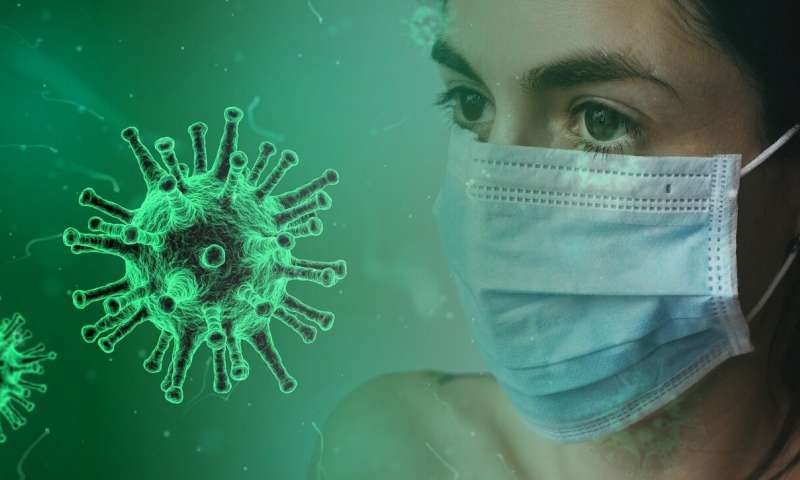India’s coronavirus death toll soared through 200,000 on Wednesday with a wave of new cases swamping hospitals and sending desperate families off to scour the capital for oxygen and medicine as Europe’s registered cases topped 50 million.
The vast south Asian nation of 1.3 billion is fighting a major surge of 360,000 new infections—a global daily record—and reported more than 3,000 deaths on Wednesday.
In contrast the United States, the UK and some European nations are taking tentative steps back towards normal life.
However, Europe had cause to pause with the total number of cases since the pandemic began hitting 50,021,615, according to a tally from official sources compiled by AFP at 1715 GMT.
The virus has now killed more than 3.1 million people worldwide with Europe the worst-hit region.
Offering a glimmer hope, the co-founder of BioNTech—which developed a COVID-19 vaccine with Pfizer—said he is confident the shot works against the variant that is plaguing India.
In New Delhi, car parks have been converted to crematoriums and the body count has sparked a shortage of wood for funeral pyres.
Relatives of the sick are crowding outside hospitals and pharmacies in search of treatment and medicines.
Priyanka Mandal, 30, has been searching for oxygen for her mother since she became sick a week ago.
“Medicines are also not available… I’ve visited five, six big medical stores,” she told AFP.
“No matter how much time it takes, I have to wait here… I only have my mum.”
‘Auspicious’ full moon
Despite the raging pandemic, on Tuesday 25,000 people took part in the final bathing day at the Kumbh Mela religious festival in the northern Indian town of Haridwar, drawn to the banks of the Ganges by an “auspicious” full moon, festival official Harbeer Singh told AFP.
The gathering has attracted millions of pilgrims, mostly without masks, fomenting criticism of Prime Minister Narendra Modi’s Hindu-nationalist government for allowing it to go ahead.
The variant of the virus feared to be contributing to the catastrophic wave in India has now been found in more than a dozen countries, the World Health Organization said.
But the WHO has stopped short of saying it is more transmissible, more deadly or able to dodge vaccine protections.
Many nations have rushed to help, sending desperately needed oxygen and aid.
As part of the global effort, Singapore said Wednesday it had sent two plane-loads of oxygen supplies, and Germany will deliver 120 ventilators and plans to set up oxygen production.
Russia said it was sending emergency help to the country—including oxygen support, ventilators and medicine—while Switzerland was sending $1 million (827,000 euros) in aid for hospitals.
Britain also announced Wednesday it was sending three oxygen ‘factories’ the size of containers to India following a first consignment of aid this week
India also looks set to receive some of the millions of AstraZeneca vaccine doses the United States has said it will export.
And Ugur Sahin, the co-founder of BioNTech, said the vaccine his company jointly developed with Pfizer appears to protect against the Indian variant.
“We are still testing the Indian variant, but the Indian variant has mutations that we have already tested for and which our vaccine works against, so I am confident,” said Sahin.
‘Great to be here’
As India battled horrific conditions, the Dutch feted the end of curfew and the opening of cafe terraces.
“It’s great to be here with my girlfriend and my friends. I think it feels great after six months being inside,” Marvin Erhart told AFP from a cafe in the Hague.
The lifting of measures follow similar moves in Italy, Portugal and Switzerland that have recently peeled back restrictions—even as governments scramble to roll out much-needed vaccines.
Milan’s Scala Opera House announced Wednesday it will reopen from May 10 to an audience limited to 500.
France is hoping to join the trend and ease more restrictions this month, but is still battling to reduce significantly the numbers in hospital, dying and being infected.
President Emmanuel Macron will lay out the next steps on Friday.
The European Union (EU) on Wednesday accused Beijing and Moscow of stepping up “state-sponsored disinformation” campaigns against Western-developed vaccines while promoting their own.
The EU is eager to speed up its sluggish immunisation drive after it sued the British-Swedish firm AstraZeneca for allegedly breaking their purchase agreement.
The bloc and the pharmaceutical giant are set to meet in court on May 26.
Britain meanwhile announced it had ordered 60 million more doses of the Pfizer/BioNtech vaccine for a booster programme to protect the most vulnerable during winter.
In Japan, organisers of the Summer Olympics said athletes and close contacts will have daily virus tests.
The announcement came after the Australian government said an estimated 2,000 athletes and staff would be vaccinated before travelling to the Games, which are scheduled to begin on July 23.
The Olympic organisers also said they won’t decide until June how many spectators—if any—can attend the delayed Games, with chief Seiko Hashimoto warning that “as of now, having full venues is very difficult”.


